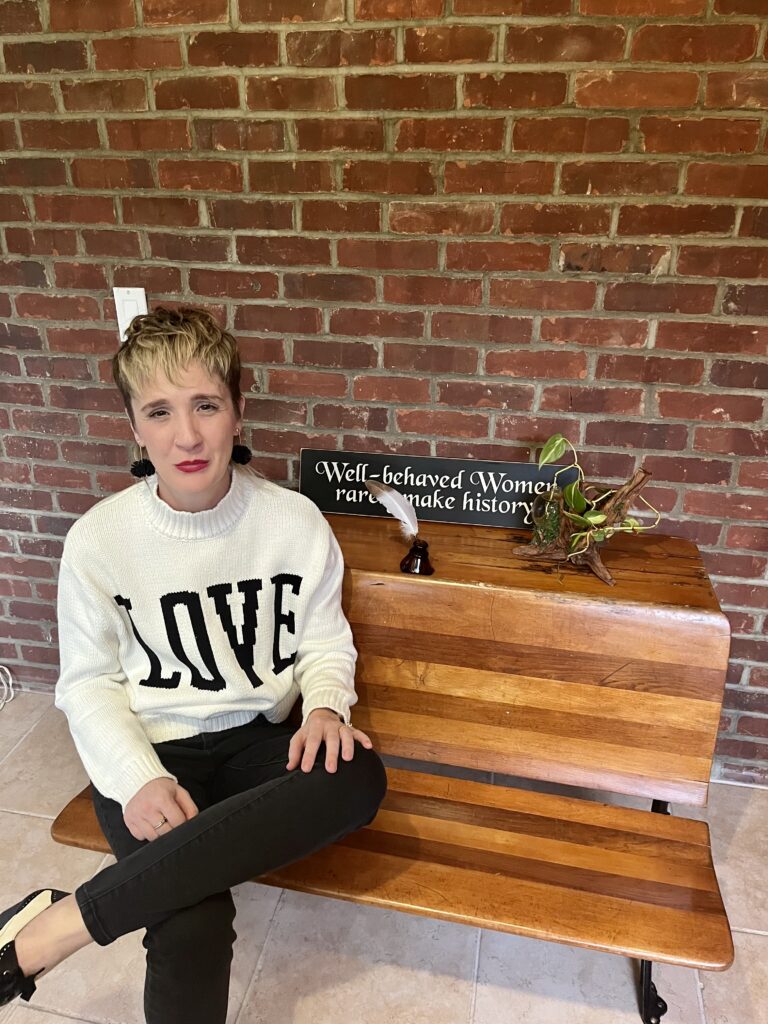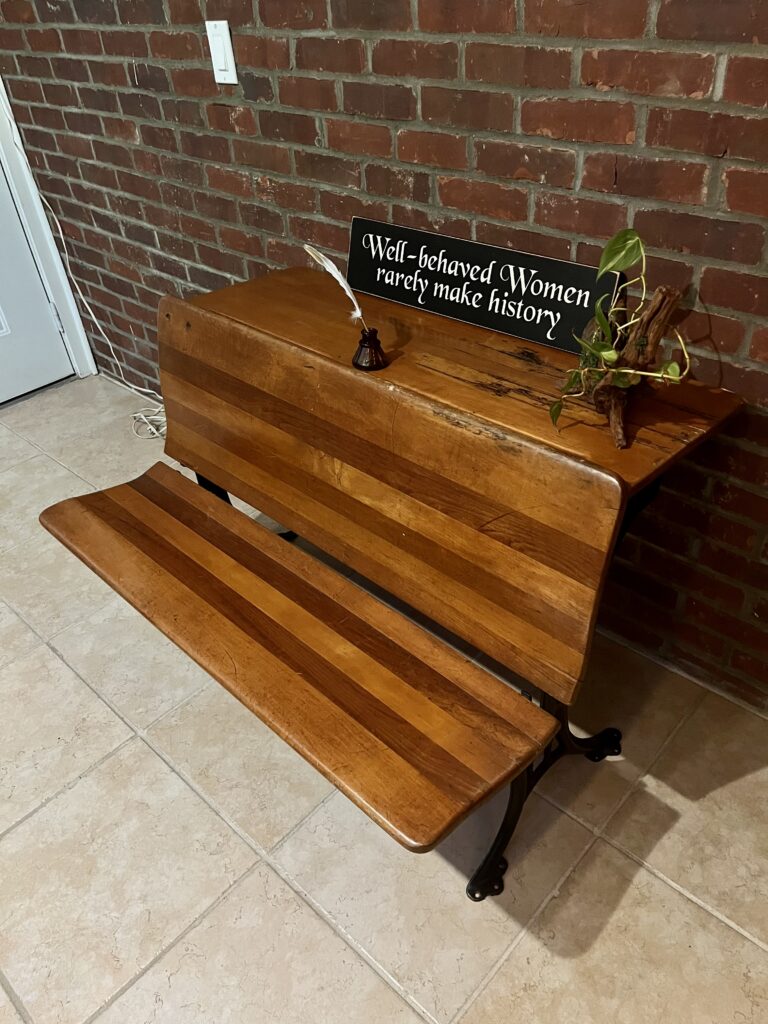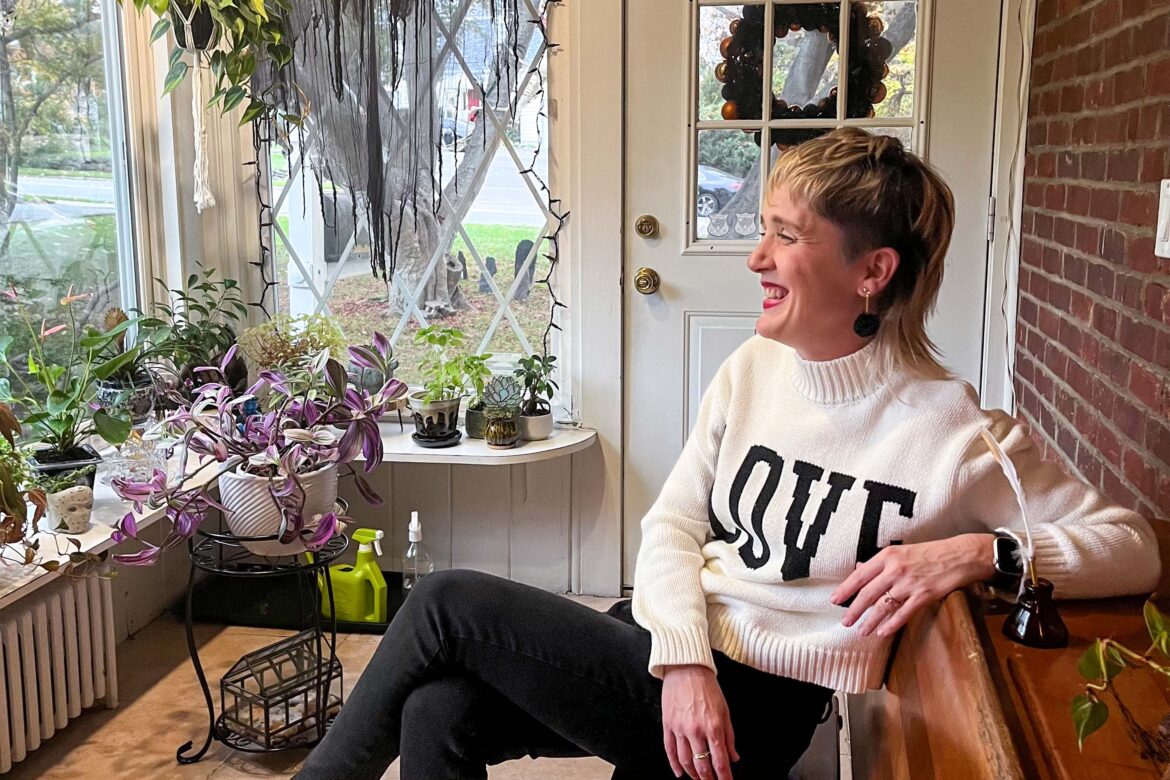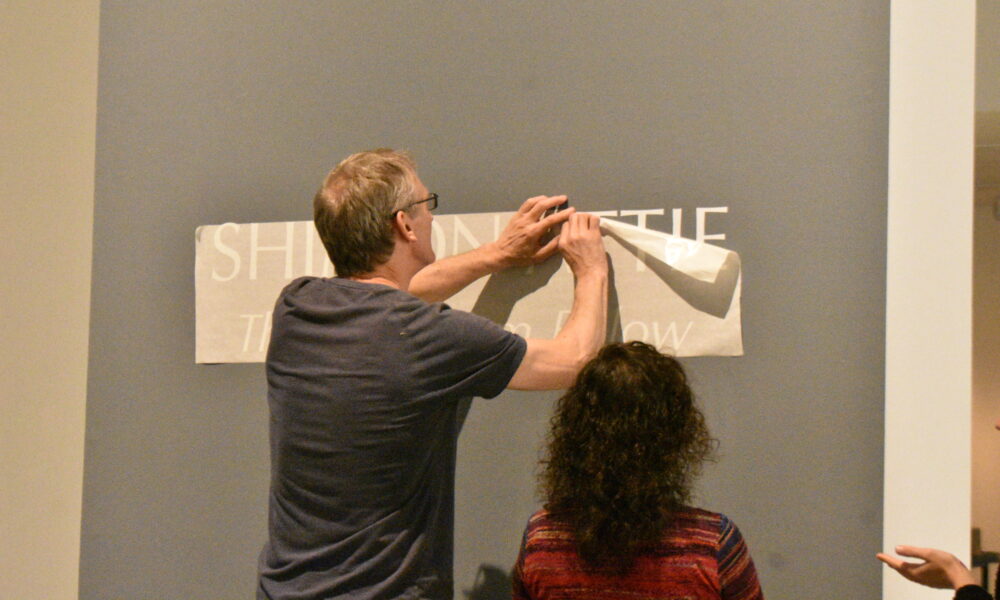Photo by Jessica Castagna.
An antique wooden school desk sits in the sunroom of Janet Schuellein’s new home in Huntington, New York. It has visible wear from childrens’ use, but the intact finish of the wood indicates it has not just been loved, but also cared for. The vintage school desk has been repurposed, with the desk end pushed towards the wall, while the outward-facing bench is the perfect spot for Schuellein to gaze upon the plants in her patio enclosure, or look over her kids’ papers.

The young adults that Schuellein, 43, teaches English to at Oceanside High School are not simply her students. She never uses the word “students” when referring to them. She always calls them “my kids.”
“It’s a strange form of parenting,” Schuellein says of being a teacher for 22 years. “We’re here to make sure they’re warm, safe, willing to take risks and then we can teach.”
Schuellein, affectionately nicknamed “Schu” by her students, has no children of her own. Schuellein and her husband, Drew MacCallum, were married by an Elvis impersonator on Halloween in 2021 and do not plan to have children — a decision that has given Schuellein the space to indulge in her own joys. She hangs prints of her husband’s photography in their new home, enjoys lavender iced lattes with oat milk and cinnamon at her local coffee spot and lays out her Halloween ensemble for school — including spooky outfits for the week beforehand. She says that her students have assumed that she has children and they are shocked when she corrects them.
“I want them to think – I’m not, and you’re not, obligated to do anything in this world,” she says. “I say, ‘you’re my babies.’ And they’re like, ‘well we know that.’”
Schuellein does love kids — she spends time with the dozens of high schoolers who flood her classroom each school year and her nine nieces and nephews from three older sisters. She says that she never felt arm-twisted to have children by her family, especially by her mother, who was pressured to skip college and choose marriage and kids over a career of her own. Schuellein’s mother told her children that, as long as they secured health insurance, she would be happy.
“That was our only caveat: get a job with health insurance,” Schuellein says of her mother.
As a teenager, Schuellein was accepted into her local public school’s performing arts program. She joined a gospel choir where she grooved to Janet Jackson, while her fine arts courses lit her passion for art history, as she studied the work of the French post-impressionist artist Paul Gauguin.
Schuellein brings art, culture and religion into her classroom to teach literature more deeply. She arranges her students’ desks into a closed circle to promote engagement. The walls hold students’ artwork, a gigantic depiction of the Bride of Frankenstein, a poster for Ray Bradbury’s Fahrenheit 451 and a Harry Potter-themed sign that forbids boys and girls from being within six feet of each other — a decoration introduced after the onset of COVID-19.
“When I teach dystopian lit., I start the beginning of the year with the Sistine Chapel,” Schuellein says. “They don’t know that they’re looking at the Sistine Chapel. It’s the one where God’s creating Adam, and they’re about to touch.”
She refers to Michelangelo’s painting on the ceiling of the Sistine Chapel, “The Creation of Adam,” which depicts a biblical scene in which God gives life to Adam while angels surround him. Schuellein instills the concept of wonder as she prompts her students to ponder with a series of questions: “What do you see?” “What does that make you think and wonder?”
“That’s what you should do with anything,” Schuellein says.
Schuellein, a 90s baby, loved to learn as a youngster, but was equally fearful of school. Her own schooling experience was not simply sunshine and rainbows, flared jeans and tattoo chokers. She remembers hanging from the pull-up bar during gym class while a group of girls heckled below and threatened to beat her up if she let go.
“We were doing slam books when we were in high school, where you put a person’s name on it, and people wrote whatever they wanted and sent it around,” Schuellein says of an experience reminiscent of Mean Girls’ “burn book.”
“Then, you could rip it up and burn it,” Schuellein says, whereas today, social media has created a modern environment where childish bullying or antics are scarily permanent. “The things they do, they’re held more dangerously accountable for, or more fairly accountable for, depending on what they do, because of the Internet. I feel bad because they’ve lost their privacy and the ability to be free and make mistakes and be kids.”
Schuellein is a firsthand witness of how technology has changed young peoples’ schooling. At the front of her classroom, she has a wall of plastic pouches, which she asks her students to place their phones into for the duration of class. Rather than a tactic to force her students to engage with the material, Schuellein uses the phone wall to give her students an opportunity to disengage with their technology.
“I tell them that this is 42 minutes where you’re free,” she quips. “Some of the kids laugh, like, ‘Oh good, my mom can’t text me right now.’”
Schuellein says that the Internet has also posed difficult situations for students with regard to their grading. Students’ grades are posted live online for their parents or guardians to access.
“I never post a grade unless I show it to the kid first,” she says. “That way, they’re prepared. And if it’s a great grade, wonderful, and if it’s a bad grade, I talk to the kid about it so they’re prepared, you know, to do better, but also to be confident when they talk to their parent, like ‘look, I’ve spoken with the teacher and this is the game plan.’”
Schuellein is a firm believer that young people today are not better or worse than previous generations of children. The world that they live in has morphed, primarily due to the rapid technological advancements that society has endured. Children, along with their parents and teachers, are trying their best to navigate this new world.
“People say ‘They were better when…’ they weren’t,” Schullein says. “They were just as naughty. I think the pressures for kids are amplified. And I feel bad for them.”
She refers to the pressure among students to enroll in college-level courses, such as Advanced Placement (AP), while they are still in high school. She expresses the anxiety she witnesses among her students, many of whom fear that if they are not enrolled in enough AP courses, or do not score high enough, they will not be receiving college acceptance letters. Schuellein assures her students that they will, and that they should really be saving some college-level work for college.
“It was simpler when I went to school, but the bad stuff was still there,” Schullein says. “The depression was still there.”
She is thankful that students in her district have access to a wellness center that can provide them with mental health resources if they would like them, and wishes these aids were available more widely across the United States.
Whether she is using the game-based learning platform Kahoot! or challenging them to create a five-song soundtrack for the portion of a book they have read so far, Schuellein wants her students to connect with literature in a way that is relevant and interesting to them. English teachers at Schuellein’s school hand out book tokens to students that are redeemable at the book vending machine as part of a movement the school calls “promoting book love.”
Schuellein is representative of teachers who simply love working with young adults and want to prepare them for their future lives in the ever-changing world around them. Above all, she promotes universal empathy, even when she has received complaints from parents about their childrens’ assigned reading material. Schuellein says that the vast majority of readings she has assigned, such as Fahrenheit 451 by Ray Bradbury or V for Vendetta by graphic novelist Alan Moore, are either banned or restricted somewhere within the U.S.
“It is what it is,” she says. “Parents are in a panic. No matter what, I am compassionate. They’re worried about their baby. If it’s political or literature-based, either way, it’s grounded in fear for their child.”
A 2022 study conducted by the Pew Research Center found that U.S. parents of K-12 students are divided on whether or not students should be learning about hot-button topics such as the legacy of slavery or gender identity in schools.
According to the study, “31% say they would prefer that their children learn that whether someone is a boy or a girl is determined by the sex they were assigned at birth, and the same share say they’d rather their children learn that someone can be a boy or a girl even if that’s different from their sex at birth. A 37% plurality say their children shouldn’t learn about this in school.”
In Schuellein’s case, listening to a parent’s concerns, engaging in open communication and asking them to read the material themselves have been the best methods for settling nerves. She recalls three instances where a parent has apologized to her for misjudging what was being taught in her classroom.
An assigned reading that Schuellein has received parental complaints about is a legitimately provocative piece of literature: From Homogeneous to Honey, a comic by Neil Gaiman and Bryan Talbot. The comic’s title references a skip from “homogeneous” to “honey,” if the word “homosexual” were removed from a dictionary. Written in 1988, amidst the AIDS crisis and homophobic legislation in the United Kingdom that forbid the support of homosexuality, From Homogeneous to Honey outlines the steps an oppressor takes towards domination.
Though the comic does not explicitly state Heinrich Heine’s eerie quote, “those who burn books will in the end, burn people,” the work is overwhelmingly demonstrative of the devastating concept: restricting literature is, historically, a step towards persecution based on race, ethnicity, sexual orientation or any form of otherness.
After discussing From Homogeneous to Honey, Schuellein plays a LGBTQ+ short film by Alice Wu and sponsored by Oreo Cookies in support of Pride Month.
“There’s always the beauty and the love, the people that push back against the dangerous thing,” she says, as she underlines that to restrict students’ access to a comprehensive understanding of history is to disservice them. Schuellein’s teaching stance takes on even greater importance when examined alongside the wave of book bans crossing the US.
In a data release of 2023 book challenges, The American Library Association (ALA) and their Office for Intellectual Freedom (OIF) recorded 695 attempts to censor over 1,915 library titles and services between January 1 and August 31, 2023.
“The number of unique titles challenged has increased by 20 percent from the same reporting period in 2022, the year in which the highest number of book challenges occurred since ALA began compiling this data more than 20 years ago,” reads ALA’s data release. “Most of the challenges were to books written by or about a person of color or a member of the LGBTQIA+ community.”
Schuellein’s approach to teaching topics surrounding sexuality and gender identity is to give students the literary and historical resources they need to produce a full perspective. She does not push her students, she provides for them. After all, they are her kids.
“They need literature to explore all the ugly, the good, the bad, the beautiful, everything,” Schuellein says. “They just need the right book and a good book. And patient teachers, which I think there’s a lot of.”
According to Schuellein, her surname roughly translates to “little school,” and may also mean “schoolgirl” in Luxembourgish. Aside from Schuellein and two of her three older sisters, who also teach, the translation is suggestive of an ancestral tree that may have contained an even longer line of teachers. While the teaching profession may seem genetic in her family, Schuellein says that the reason someone becomes a teacher is a much deeper quality. Someone who will make an effective teacher does not enter the teaching world solely because they would love to have a summer vacation, or because they think their students will automatically show them authority and respect.
“You go into it because you love working with children and you love making them feel safe and warm first, before you even teach them a lick,” Schuellein says.

The antique school desk that has found a home within Schuellein’s quaint Huntington sunroom demonstrates the power of care — a weekly dusting, or an occasional coat of wood polish maintains its stunning appearance. For Schuellein’s kids, care is shown through unconditional love — her classroom is a safe space that encourages them to explore the world through literature. She builds trusting relationships with her students by keeping her promises, even when that means she has to pay a 30 push-up tardy fee if she is late for class.
Above all, Schuellein hopes her students reach destinations similar to the fate of her antique school desk, which is well-loved, sturdy and basked in warm sunlight.




Comments are closed.